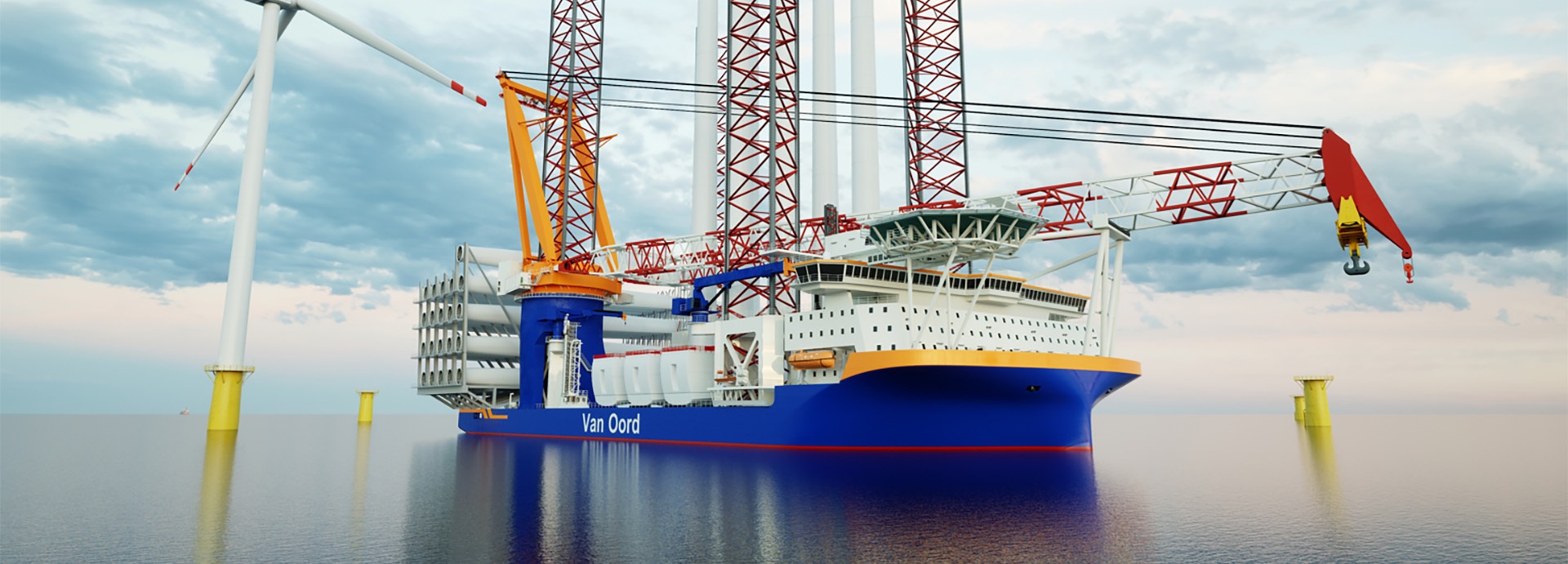

New methanol-powered vessel helps Van Oord cut carbon
- Challenge: Build greener vessels to reduce emissions
- Solution: A newbuild vessel than can run on methanol, backed up by a lifecycle service agreement.
- Benefit: A low-carbon vessel with the flexibility to adapt over its 30-year life to take advantage of new fuels and upgrades as they become available.
When you want to accelerate decarbonisation in your operations, what’s the best way forward? For Dutch marine contractor Van Oord, one way to reduce its emissions is by building greener vessels. The company is currently building a new offshore wind installation vessel that can run on green methanol, a carbon-neutral fuel.
Fulfilling a mission for greener shipping
Van Oord takes green issues seriously. Their mission is to “create a better world for future generations by delivering marine ingenuity”. One example of how the company is leading the way in the energy transition is by constructing offshore wind farms with the help of a wide range of offshore installation vessels. Van Oord is constantly looking for ways to minimise the emissions from these vessels. “Our strategy is based on improving energy efficiency and the use of low carbon fuels,” explains Job Voormolen, Innovation Manager for Sustainability at Van Oord. “We see methanol as one of the safest and most practical fuels to use in the future and as a credible path to net zero starting from today to 2050.”
As a marine fuel, methanol has many advantages. Methanol is relatively inexpensive to produce, is widely available and easy to store. Furthermore, the global supply infrastructure for methanol is already established, a key point in making this a practical fuel choice for shipping. Green methanol is an even better choice because of how it’s made. The best option would be e-methanol, which is manufactured from hydrogen produced using renewable electricity and recaptured carbon, making it carbon neutral.
The simplicity of a complete solution
Van Oord selected the Wärtsilä 32 Methanol engine for their new offshore wind installation vessel. It uses tried and tested methanol fuel injection technology – first developed in 2015 for the converted engines onboard the RoPax vessel Stena Germanica. The set-up also includes Wärtsilä MethanolPac, a complete fuel supply system for methanol-fuelled ships. This system contains all the required low-pressure equipment like the bunkering station, tank related equipment, methanol process equipment and the control and monitoring system. The high-pressure part of the system includes the methanol fuel pump unit and sealing and control oil pump unit.
For Van Oord, having a complete system like this simplifies the process of installation. “The complexity of a new fuel installation on a vessel with regards to safety, power management and controls means you have the best chance of success if you go with integrated system design,” says Voormolen.
An important step on the road to net zero
Van Oord will continue to benefit from Wärtsilä’s services and help during the lifetime of the vessel, with improvements and upgrades offered as they become available or are needed. Wärtsilä Lifecycle Services also ensure that maintenance is performed proactively. The goal is to continue to enable high environmental performance with safe and efficient operation and maximum uptime.
“We’ve worked with Wärtsilä on several projects over the years, and we knew they would take a proactive approach to methanol in line with our desire to deliver a safe engine for our vessel. That’s why we were confident in selecting them for this project to accelerate the energy transition, based on a new type of fuel,” concludes Voormolen.
Discover how fuel-flexible engines can support long-term decarbonisation. Download Wärtsilä’s white paper: “Offshore gains – How to tackle three challenges and sharpen your edge”





